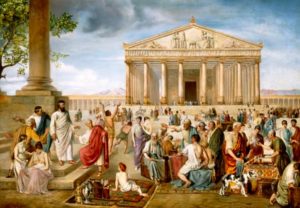[Greek] εἴδωλον (eidōlon), [Latin] simulcro, [Latin] idola: ghost, phantom, shadow, spectre, spirit, image, god, heathen, apparition, vision, statue, figure, form, idol; Rev.9:20, Act.7:41, Act.15:20, Rom.2:22, 1Cor.8:4, 1Cor.10:19, 1Cor.12;2, 2Cor.6:16, 1Thess.1:9, 1Jn.5:21

St. Paul preaching before the Temple of Artemis (painting by Adolf Pirsch 1885)
Background Information:
Greek Hellenism: This term takes on the sense of a figure, picture, or copy, whether artificially made, self-reproduced, or simply present. This means the figure of a man, not the man himself. Although this term can be used for the image of gods, the primary Greek cultic image refers to a statue, not an idol. This Greek conception can refer to a reflection in the water, shadow, shade, or apparition. The inhabitants of the underworld are no longer men but only copies. A work of art can be considered a copy quite distinct from true reality. Although the pagan Greeks honored (worshiped) the gods, the Hebrew (Jewish) culture developed a much more negative attitude toward idols. The pagan culture has no frame of reference regarding the modern understanding of an idol.
Jewish culture: This Jewish hostility developed from its history of idol worship and idolatrous references profoundly opposed to the one true God. Idols emphasize the unreality of heathen belief and the unreality of the heathen gods. The heathen has images but not the true God. The idol is an unreal god, which some have put their faith in place of God. This Jewish perspective has essentially created our current understanding of what an idol is.
New Testament: The New Testament culture continues the Jewish belief system about heathen gods and images. Interestingly, this term does not occur in the gospels. Instead, this term is found in Acts, Paul’s letters, and John’s epistle. Paul takes a wholly Jewish attitude in saying that these idols are associated with sin, folly, demons, and unreality. The New Testament presents this term as an idol and a false god.
Scripture:
“So they made a calf in those days, offered sacrifice to the idol, and reveled in the works of their hands.” Act. 7:41
Stephen refers back to the idol worship of the Israelites in the wilderness. This incident provides evidence of the Jewish hostility towards idols.
“You know how, when you were pagans, you were constantly attracted and led away by mute idols.” 2Cor.12:2
Corinth was heavenly influenced by paganism. These former pagans had often made sacrifices and settled matters in pagan courts.
“What agreement has the temple of Go with idols? For we are the temple of the living God’ as God said, ‘I will live with them and move among them, and I will be their Go and they shall be My people.’” 2Cor.6:16
This scripture passage makes a distinction between God and the idols. In contrast to the idols, God has a covenant relationship with His people. God maintains His presence among His people.
“Children, be on your guard against idols.” 1 Jn. 5:21
God, in His concern for His people, warns against idols. Idols are a type of rival to God.
Conclusion:
Idol, idolatry, idolatrous, simulcra
It was interesting to discover the neutral attitude that the Greeks had towards images and copies. This term really did not apply to the gods whom they worshiped and honored. Instead, this term applied to mundane items like art, shadows, reflections, and apparitions. Essentially, this context did not apply to the Greek gods.
It also was not surprising why the Jewish (Hebrew) culture held such hostility towards idols. Understandably, this culture had some very bad experiences with idols in the past. From this comes our current and presently held view towards idols. I always knew worshiping idols was a false worship. I really do not consider the idol’s aspect of unreality
Interestingly, there is no evidence of the pagan use of this term prior to the Septuagint. Essentially, the Jewish culture began this practice of applying this to term to paganism and idol worship. This was originally a Jewish literary device (invention) to condemn idols.
